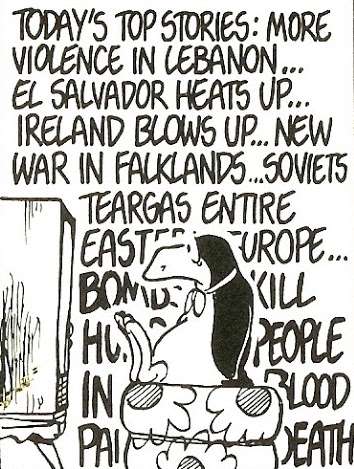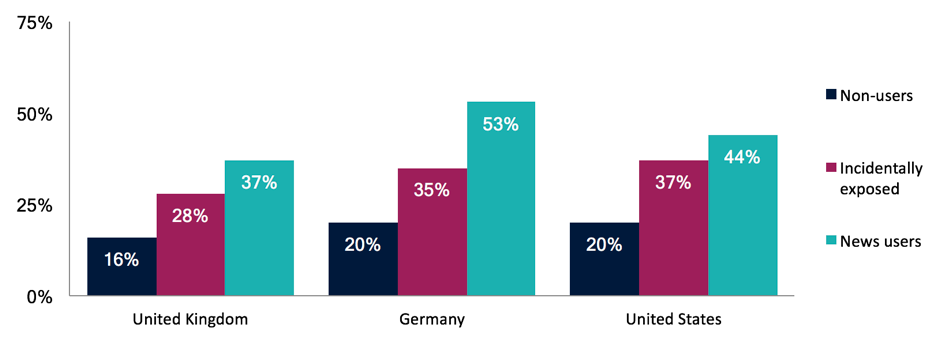Social Media Users Encounter More, Not Less, Political Diversity
Our media consumption is increasingly personalized. But personalized does not mean isolated.


If you use social media, you're more likely to get your news from more than one political perspective, according to a study by the Oxford-based researchers Richard Fletcher and Rasmus Kleis Nielsen.
This flies in the face of the accepted wisdom that says the internet segregates society into ever more cloistered communities of like-minded people. Ideological bubbles are real, but ideological bubbles have always been real; they may well be more permeable now than in the past.
If you regularly read this website, you're probably a "news user"—one of the three groups Fletcher and Nielsen identify in a YouGov survey of internet users around the globe. News users go online for the express purpose of reading about current events.
The second group is the "non-users." These are the people who avoid social media altogether. And somewhere in the middle there are the "incidentally exposed": people who use social media for nonpolitical purposes, but could conceivably come across a news story anyway. Think of someone who visits Facebook to stay in touch with friends but might click on a news story that comes up in the feed.
Fletcher and Nielsen zero in on data from the United States, the United Kingdom, and Germany in a write-up of their findings at the Nieman Journalism Lab. As you might expect, news users drew on more media sources than anyone else.
In America, for example, they reported reading or viewing stories from an average of 5.16 different sources in the previous week. The incidentally exposed group, in turn, drew on more sources (an average of 3.29) than the people who didn't use social media at all (an average of just 1.8).
"These differences remain statistically significant after controlling for a range of demographic and news attitude variables," the authors note.
Needless to say, not everyone who looks at more than one news site is looking at sites from more than one point of view. But if you use social media, you're much more likely to take in sources from multiple perspectives. This chart shows the percentage of each group that used both at least one source from the left and at least one source from the right:

As you can see, most Americans don't look at stories from more than one political perspective. But people who are on social media clearly tend to have a more diverse news diet than people who aren't.
Bonus link: For more on this theme, check out my review of Eli Pariser's book The Filter Bubble. Here's an excerpt:
Yes, our media consumption is increasingly personalized. But personalized does not mean isolated. Pariser imagines the Internet becoming a stagnant "city of ghettoes" where "connections and overlap between communities" disappear. But how many people belong to just one online community? A personalized Internet is an Internet geared toward your particular combination of interests, and therefore to your particular combination of human networks. If you're a Methodist Democrat in South Baltimore who watches birds, follows basketball, and loves Elvis, you might be in touch online with people who share your faith but not your politics, and vice versa; your neighborhood but not your hobby, and vice versa; your taste in sports but not in music, and vice versa. That isn't a city of ghettoes. It's a city of crossroads.
And while there may be many good reasons to hate Facebook, an insufficient diversity of views isn't one of them. One of the chief effects of using the site, after all, is to discover your friends' horrifying opinions.


Show Comments (39)